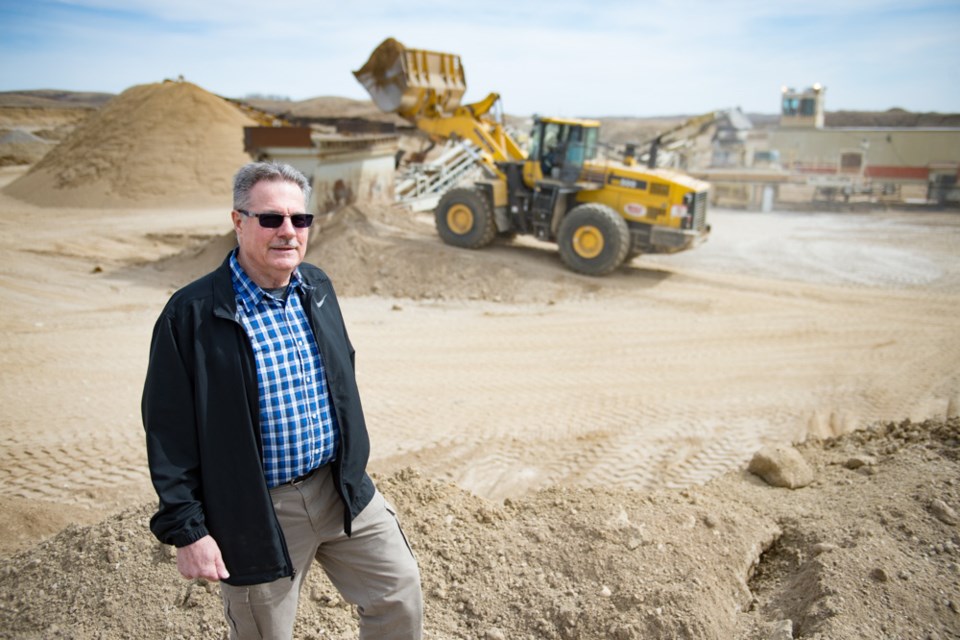Stoughton– “For the original shareholders to celebrate 70 years, it’s awesome.”
That’s how Del Coderre feels about the 70th anniversary of W.H. Coderre & Sons Construction Ltd., (also known as Coderre Construction) which was celebrated two years ago, when roughly 150 people attended the festivities. In the office is a mounted photo spread showing him as a child standing with his parents in front of a new truck, and a similar photo taken 65 years later. Other photos show the progression of the company and Coderre family over 72 years in operation.
Del Coderre owns and operates Coderre Construction with his brothers Randy, who looks after the shop, and Kim, who is in charge of screening and concrete aggregate. The trio are the second generation to run the local, family business, which was founded by father Wilf and mother Lucy Coderre in 1945.
Lucy, who did the books for decades, passed away in August 2016. Wilf, now 96, lived next door to their shops until just three months ago, when he moved into a care home in Fillmore. The brothers’ twin sisters, Tammy Coderre-Kells and Lynne Morrison, were not involved in the business.
“It was a mom-and-pop operation, no doubt, for a long time,” said Del on April 11. “When Dad first started, it was Coderre Transport. He hauled pretty well everything: gas, cattle, gravel, farm equipment and grain. It evolved more toward gravel later.”
In 1952, oil was discovered nearby, north of Forget, when Del was four. “Some of the guys working on the drilling rigs were boarding at my grandmother’s place in Forget,” he said.
Del pointed out the discovery well is along the road leading to their Bell Pit, one of three primary gravel pits that services their operations.
“Now they’re drilling some wells in exactly the same places,” he said.
Gravel and associated aggregates have been Coderre Construction’s primary business for most of these last seven decades, after picking up their first gravel pit about 11 kilometres north of Forget in the mid-1950s. It was an old school site, 10 acres in size, in the middle of a Prairie Farm Rehabilitation Administration pasture just south of the Moose Mountains. That gravel pit was still seeing use up until about five years ago, and they still have some material there.
“We process and supply gravel, sand and rock products,” Del said. Coderres haul gravel, too, and have six of their own trucks, but they will often use the trucks of their clients for transport. Coderre Construction supplies six different aggregate products to redi-mix operations in the region. He noted they are in a central location to service Weyburn, Estevan, Carlyle and Kipling. They also work for the Ministry of Highways, RMs, towns and villages, supplying aggregate.
The company has a couple of excavators and does a little digging. “We demolish and dispose of buildings, dig dugouts for farmers and snow removal,” Del added.
Around 1960 the operation got its first screener, allowing them to make various screened gravel and rock products. Del said, “In 1969 we got a crusher and started crushing gravel.”
“The RMs started asking for crushed gravel. A big part of our workbase is rural municipalities,” he said.
Now they have a jaw crusher, which reduces large rocks to roughly 13 centimetres (five inches) in size, and a cone crusher that will take it down to as small as 16 millimetres (five-eighths of an inch), if desired. That equipment, plus a screening plant, will rotate between their three main pits. One pit is north of Arcola, another north of Forget and a third north of Stoughton. The Forget Bell Pit is the primary operation.
Those pits run in a string along the south side of the Moose Mountains, and are the result of glacial moraines depositing gravel as the giant ice sheets retreated to the north. “I think we have to thank the glaciers for that, as well as stream outwashes and glacial lakes,” he said. “There is no end of gravel there.”
Gravel resources are becoming more scarce, however, in many areas. He noted over time that people are looking further and further afield for their gravel supplies.
The company was able to keep their staff during the oil downturn. They moved into their new shop, beside their old shop, in 2015.
The oil industry has never been the bulk of their business, but oil production has definitely been important. He noted oil companies are among the largest taxpayers in some municipalities, and they need roads for their sites. Additionally, they supply gravel for leases and lease roads, tank bases, and sand for sandpadding pipelines. The company has a grader which is used for lease roads as well.
Coderre Construction benefited from the Bakken boom, which centred around Stoughton. “About 2007, it got really busy in the oilfield,” Del said.
While the development of the Bakken has been of enormous importance to Stoughton and its businesses, a new prospect is on the horizon – a proposed 40,000 barrel per day oil refinery southwest of the community.
“That’s big news,” Del said, adding he thinks it will go ahead. “Everybody’s pretty optimistic. It’s huge.”
For a gravel company, such a large site could mean plenty of work, with many acres requiring coverage in gravel. “We’re hoping to get our share of it,” he said. “Hopefully everybody local gets their share. What more could you ask for?”



